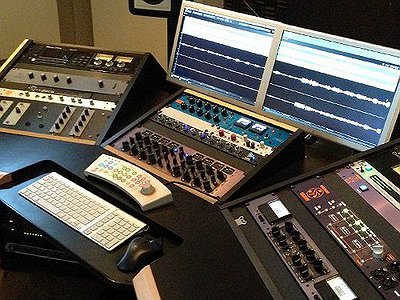Budgets for productions are being reduced and more and more people are choosing to listen to music in compressed formats and on low-quality playback devices. In which way is this affecting music and how would you rate the state of production today?
Mastering engineers always talk about how ironic it is that we use all of this expensive analogue outboard equipment only to have songs listened to by people on their phone speakers as they walk down the streets. But at the end of the day we have to keep striving for the best audio quality we can because it really does matter. The loudness wars and low-quality MP3 formats have been a driving force in the decline of music sales alongside pirating and streaming services.
There are still a lot of people out there who care about great sounding music and those are the people for whom I work hard to please. Engineers can’t just give up and let the cell phones win. If we care about what we do, if we’re passionate, it will come through in the music and ultimately make the industry a better place.
The equipment-industry suggests that new equipment keeps making productions better. How much do you believe in the idea of progress in mastering? What are areas where you could imagine real improvements?
The equipment, computer, and most other industries love telling you that what you have now isn’t good enough and that it won’t be good unless you upgrade to the latest and greatest tools. It’s a cycle we all get forced into by software updates and the addition of useless features and the continual dumbing down of the computer experience.
The equipment in my studio ranges in age from the '60s to the present. While I love the sound of vintage recording equipment, I also love the conveniences of digital tools and the possibilities we've been given thanks to our computers. I have a wonderful range of equipment, both old and new, that allows me the best of both worlds; modern convenience and innovation mixed with vintage character and vibe.
There is also a lot of mastering gear made today that is based on designs from a few decades ago. These aren’t software emulations I’m talking about - although there are some wonderful ones there - but circuit and tube designs that capture the character of 50-year old equipment.
A lot of the progress in modern mastering has been made to combat the ill effects of modern recording and listening. It’s sort of a circle of problems and solutions. I don’t think there is, or needs to be, a lot of innovation in hardware recording equipment design. Besides boutique companies releasing classic or upgraded versions of classic designs, we get rewarded with more choices or cheaper prices, which is great. There’s been amazing progress in the quality of software, however. From both the analogue emulations to really amazing restoration algorithms. Those can be real time-savers and yield wonderful results.
I’ll often be able to fix a spot of distortion or noise in a client’s recording without them having to go back and re-record the song. That’s a win-win situation for everyone. I’m not so concerned anymore with upgrades or improvements, as I feel I have a very solid, working system.
I am a bit obsessed with more options, especially when it comes to sound design and synthesis. I’m quite happy to see the knob-laden analogue synthesizer making real a comeback with current big manufacturers and the passionate world of modular synthesizer makes and users. For me there is no comparison between using a well-designed hands-on hardware synthesizer versus a plug in.
It has often been suggested that "the future of music is in live”. How do you feel about the ongoing relevance of recordings as an art form? What can recordings provide what a concert cannot?
The future of music has been foreseen in live performance because it’s getting harder and harder for musicians to make money selling albums thanks to the pirating and file-sharing. Unfortunately, the majority of musicians making music out there either aren’t able to, or don’t want to tour and play live. It’s a real negative view of the state of things if people write-off the enjoyment or innovation of the recorded art form.
I enjoy playing live, but I much prefer to work in the studio. There, I have the time to craft the exact output I want, over months of time in the comforts of my studio with all of my equipment. Playing live usually means a limited amount of gear in a more-often-than-not terrible acoustic environment. Not that wonderful things can’t, and don’t happen in live situations.
I’ve released a lot of live recordings because happy accidents and magic can happen when you least expect it. However, I think most innovation and beautiful music still comes, and will come, from studio sessions. We just need to get listeners to stop stealing from artists and for the artists to get the respect they deserve as hard-working thinkers and creators.
Usually, it is considered that it is the job of the producer and/or mastering engineer to make a recording sound great. But listening is also an active, rather than just a passive process. How do you see the role of the listener in the musical communication process?
Well, let me clarify that a recording cannot sound great unless it is MIXED well. Some people falsely view mastering as a crutch, to save poor mixes, but there is only so much that mastering can do. If a mix is really bad there is very little mastering can do to save it, but a decent mix, if mastered well, can sound great.
Listeners have to be aware of good versus bad quality audio. Music is so much more enjoyable and encompassing when listened to on a proper system, in the way the artist intended it. The art of listening is so important and so easily forgotten in the world of mobile phones and Spotify. The album, as a whole, as a concept, is very important to what I do. Start to finish; sitting and listening. There are times to fast-forward your life, but not when you're listening to great music.
Please recommend two recording/mixing/mastering engineers to our readers, which you feel deserve their attention.
I don’t follow the careers of other mastering or mixing engineers, but everyone should listen to late-era Talk Talk and the solo album of Mark Hollis, the lead singer of Talk Talk. These are among the most beautiful productions captured very naturally with spirit and vibe.
These albums were recorded by Phil Brown. If more albums today were recorded like this, then less people would feel that music is disposable and maybe start listening again.




